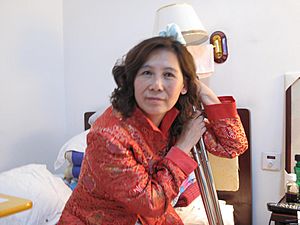Ni Yulan facts for kids
Quick facts for kids
Ni Yulan
|
|||||||||
|---|---|---|---|---|---|---|---|---|---|
 |
|||||||||
| Born | 24 March 1960 Beijing, China
|
||||||||
| Known for | Human rights advocacy | ||||||||
| Spouse(s) | Dong Jiqin (Chinese: 董继勤) | ||||||||
| Children | Dong Xuan (Chinese: 董璇, daughter) | ||||||||
| Chinese name | |||||||||
| Traditional Chinese | 倪玉蘭 | ||||||||
| Simplified Chinese | 倪玉兰 | ||||||||
|
|||||||||
Ni Yulan (born March 24, 1960) is a brave lawyer from China. She is known for helping people who are treated unfairly. She has stood up for groups like those who practice Falun Gong and people whose homes were taken away by force.
Because of her work, Ni Yulan has been arrested many times. She has also been to prison three times and faced harsh treatment. The government later took away her license to practice law.
In 2011, the Dutch government gave Ni Yulan the Human Rights Tulip award. In 2016, the United States Department of State honored her with the International Women of Courage Award.
Contents
Ni Yulan's Early Life and Education
Ni Yulan started her studies at Beijing Language and Culture University in 1978. She earned a degree in Chinese. Later, she studied law at China University of Political Science and Law. She became a lawyer in 1986. After that, she worked as a legal helper for a big trading company and also at a law firm.
Standing Up for Others
The Chinese government started watching Ni Yulan closely around 1999. This was after she helped someone who practiced Falun Gong. In 2001, her own neighborhood in Beijing was going to be torn down. This was to make space for the 2008 Beijing Olympics. Ni Yulan helped her neighbors. She tried to save their homes or get them fair money for their loss.
Facing Challenges for Her Work
First Arrest and Prison Time
In April 2002, police arrested Ni Yulan. She was filming when a neighbor's home was being torn down by force. She was held for 75 days. Ni Yulan said that during this time, she was badly hurt. This left her needing crutches to walk ever since.
She was arrested again in September of that year. She was trying to tell the government about how she was hurt by the police. But instead of getting help, she was sent to prison for one year. They said she was "obstructing official business." Her lawyer's license was also taken away.
In November 2005, before the US president visited China, police warned Ni Yulan not to leave her home. A few days later, she was attacked by unknown men while walking in a park. When she reported the attack, she was arrested herself.
Second Arrest and Prison Time
In August 2008, Ni Yulan was arrested when her own home was torn down by force. She was sent to prison for two years for "obstructing official business." Her family was not allowed to visit her. After she was released, Ni Yulan said she was beaten so badly that she could only crawl in prison. She also said she was not allowed to use the toilet much and had little water. This was because she said she was innocent.
When she was released, Ni Yulan had no home. The police made it hard for her to rent a hotel room or apartment. So, she and her husband camped in a tent in a park in Beijing. After news reporters wrote about them, the government moved them to a hotel room.
Third Arrest and Prison Time
On April 7, 2011, police arrested Ni Yulan and her husband. This was part of a time when many people who spoke out were arrested across China. Ni Yulan described many times she was treated badly while held. She said an officer once treated her very disrespectfully. Another time, her crutches were taken away, and she was forced to crawl.
On December 29, 2011, Chinese officials put Ni Yulan on trial in Beijing. They said she had committed "fraud." Because of the bad treatment she received, Ni Yulan was very unwell in court. She had to lie on a makeshift bed with an oxygen mask. Many people came to watch her trial, but they were not allowed inside. They were surrounded by many police officers. Also, some people who were supposed to speak for Ni Yulan were kept at home by the police.
In April 2012, Ni Yulan was sentenced to two years and eight months in prison. They said she was "causing a disturbance" and "fraud." Her husband, Dong Jiqin, was also sent to prison for two years for "causing a disturbance." However, people who work for human rights believe these charges were made up to stop them from speaking out. Ni Yulan finished her third prison sentence on October 5, 2013. She said her health problems were not treated in prison, and she was very unwell when she was released.
Awards and Recognition
In 2011, Ni Yulan received the Human Rights Tulip award. This award is given every year by the government of the Netherlands. At first, Ni Yulan's daughter asked for the award ceremony to be delayed. This was because Ni Yulan was on trial, and they worried the award might make things worse for her. But the ceremony had to be canceled later. This was because Ni Yulan's daughter, who would have accepted the award for her mother, was not allowed to leave China.
In 2016, she received the International Women of Courage Award. Ni Yulan was not allowed by Chinese officials to attend the ceremony. During the event, the US Secretary of State, John Kerry, spoke about her. He said that Ni Yulan has paid a big price for trying to help Chinese citizens with their legal rights. He added that her speaking out led to her being in prison. There, she was hurt so badly that she became unable to move her legs well. But he said that did not stop her. She continues to defend the rights of people in Beijing whose homes are planned to be torn down.
 | Delilah Pierce |
 | Gordon Parks |
 | Augusta Savage |
 | Charles Ethan Porter |


